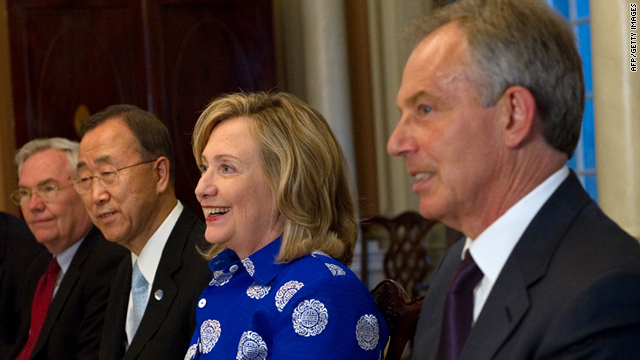Top diplomats meet to jump-start stalled Middle East talks

- Members of the Middle East Quartet met Monday night in Washington
- Their aim is to help foster long-range peace between Palestinians, Israelis
- The group includes officials from the U.S., EU, Russia and United Nations
- Several oppose the Palestinians' drive to become an independent nation
(CNN) -- Top diplomats from the Middle East Quartet -- comprised of officials from the United States, United Nations, European Union and Russia -- met Monday night hoping to kick-start stalled negotiations between Israeli and Palestinian leaders.
A group that included United Nations Secretary-General Ban Ki-moon, former British Prime Minister Tony Blair and a number of officials from member countries convened in Washington.
Before the meeting, U.S. Secretary of State Hillary Clinton refused to offer details about what these talks would entail, beyond saying, "We will discuss, in-depth, with our colleagues the way forward."
She and European Union foreign policy chief Catherine Ashton did tell reporters, though, that the goal is to figure out how to get Israeli and Palestinian officials talking again.
While violence in the region is down sharply from what it has been in recent decades, relations between Palestinian and Israeli leaders remain frosty with few formal talks about an "end-game" resolution to their long-running dispute.
"The work we're engaged in is trying to support both sides to get back into talks -- in a way, that will be the most important thing," Ashton said. "And perhaps there will be a time when ... a real celebration can begin."
The process got a jolt last month when Yasser Abed Rabbo, secretary-general of the Palestinian Liberation Organization's executive committee that is led by President Mahmoud Abbas, read a statement announcing the government's intent to go to the United Nations this September and ask to be recognized as an independent country.
Its leaders hope to get "recognition for the country of Palestine within the 1967 borders ... on the basis of international legitimacy resolutions specific to Palestine since 1947," according to a report from the official WAFA news agency. The Palestinian leadership added it is calling "on all (countries), without exception, to support this initiative" -- saying the move "will strengthen efforts to resume negotiations" over its relations with Israel.
In their statement Sunday, the Palestinian leadership cited "the ideas of (U.S.) President Barack Obama" as a reason for the move. In May, Obama made official the long-held -- but rarely stated -- U.S. support for a Palestinian state based on those borders, a position that Israeli Prime Minister Benjamin Netanyahu has said can never happen.
But days later, the U.S. president bluntly opposed Palestinians going to the United Nations for recognition. And as she has previously, Clinton stated Monday that such a move would do little to foster long-term peace in the region -- a position echoed by Ashton.
She alluded to recent celebrations in South Sudan after that country became independent -- a process the secretary noted came after years of negotiation and an election.
"That's what we're asking the Palestinians and the Israelis to do ... return to negotiations," Clinton said. "A resolution, a statement, an assertion is not an agreement. The path to two states living side-by-side in peace and security lies through direct negotiations."
